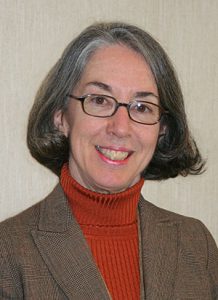 We were delighted to welcome Professor Caroline Walker Bynum (Institute of Advanced Studies) to St Andrews last Monday to give this year’s Butler Lecture on the topic ‘Nature, Matter, and Miracles: Medieval Evidence for the Life of Things.’
We were delighted to welcome Professor Caroline Walker Bynum (Institute of Advanced Studies) to St Andrews last Monday to give this year’s Butler Lecture on the topic ‘Nature, Matter, and Miracles: Medieval Evidence for the Life of Things.’
In this paper, Professor Bynum addressed the ways in which medieval people may have perceived miracles through their material culture. For instance, examining the relationship between miracles and matter, she argued that the material evidence resulting from the miracle was proof to many medieval people that the miracle had taken place; this evidence ranged from marks on an individual’s body to an ex voto left at the shrine of a saint. Using several examples from both textual and material sources, Professor Bynum traced the relationship between miracles and matter through the Middle Ages, the Reformation, and even the Modern Day.
On Tuesday, Professor Bynum led a workshop on the topic ‘Devotional Objects as Sources: The Example of Two North German Statues of Mary and Their Crowns’, for an audience of PhD, MLitt, and undergraduate students. The overall purpose of the workshop was to discuss how human relationships with objects could have symbolized a relationship with the divine. For instance, Professor Bynum used examples of nuns dressing statues of the Virgin Mary and the Christ child as a way for them to express intimacy and devotion. She also used the example of nuns wearing cloth crowns, through which they identified with the Virgin Mary, while simultaneously identifying themselves as the brides of Christ. Her presentation was followed by a lively discussion with workshop participants.
Professor Bynum is the author of Jesus as Mother: Studies in the Spirituality of the High Middle Ages (University of California, 1982), Holy Feast and Holy Fast: The Religious Significance of Food to Medieval Women (University of California, 1986), The Resurrection of the Body in Western Christianity, 200-1336 (Columbia University, 1995), Wonderful Blood: Theology and Practice in Late Medieval Northern Germany and Beyond (University of Pennsylvania, 2007), and Christian Materiality: An Essay on Religion in Late Medieval Europe (Zone Books, 2011), among many other titles.
We are extremely grateful to Dr Lucilla Butler whose support made Professor Bynum’s visit possible. Dr Butler is the daughter of Lionel Butler, the first Professor of Mediaeval History at the University of St Andrews.
Dr Butler has also generously endowed the Lionel Butler Postgraduate Scholarship in Mediaeval Studies, awarded to a postgraduate student studying for the MLitt in Mediaeval Studies or the MLitt in Mediaeval History. The scholarship was awarded for the first time in 2015 and is used to defray the general costs of study. Selection is made via application based on academic potential and applications are considered by the Director of the St Andrews Institute of Mediaeval Studies and the Head of Department of Mediaeval History.
The funding environment for taught Humanities postgraduates is particularly challenging, and this new scholarship helps to ensure that talented students who wish to pursue their interests in the mediaeval world are able to do so.
Dr Butler’s intention when setting up the endowed scholarship was to provide a foundation upon which others might build. She is therefore keen to encourage Mediaeval History alumni, especially those taught by her father, to consider joining her in supporting taught postgraduate students in Mediaeval History / Mediaeval Studies by adding to the endowment. More information on how to support the scholarship is available from Alex Hayes, Development Officer on +44 (0)1334 461918 or [email protected]